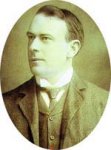 |
|
|
| Knowing as he did that there was no
time to lose, Andrews set out to do whatever he could to save as many lives as possible.
At first he spent time searching staterooms for passengers to evacuate. Running into
stewardess Annie Robinson on deck A, he told her to put her lifejacket on. "I thought
it rather mean to wear it," she explained. "Never mind that!" he answered,
"Put it on--walk about--let the passengers see you." When she protested further
he told her again, "Put it on! If you value your life, put it on." Later on the deck he was seen without a lifejacket, or even a warm coat. In spite of the cold weather he didn't need the latter; he would work himself into a sweat that night. "Ladies you must get in at once!" he cried, moving among the boats. When he came across two women joking that one boat looked prettier than another, he became exasperated. "You cannot pick and choose your boat! Don't hesitate, get in at once! Get in!" One of the people Andrews recognized being hesitant about getting on a boat was stewardess Mary Sloan, who had earlier learned from Andrews's friend Dr. O'Loughlin that "things are very bad." He personally ushered her to collapsible D, the last boat launched from the davits. At this point, there was not much left to be done. Most of those who would be saved were now on the lifeboats. For the rest, all that was left was to await the inevitable. Perhaps they would be killed as the ship broke in two; perhaps perish in the icy water of the north Atlantic. There was little hope. H aving done all the he could--all that anyone could expect--Thomas Andrews retired to the first class smoking room shortly before the sinking. He was last seen before the fireplace, gazing at the painting that graced the mantle, Approach to the New World. It was a new world he would never again truly see. What his thoughts and feelings were during those last minutes, no one can guess with any certainty. Great sorrow, perhaps regret, or a sense of futility? Could he possibly have foreseen--as depicted in the musical--that Titanic would signal the figurative approach of a new world, one that would see more and more over the next few decades the darker side of the technology that was continuing to change the world, that had contributed to the creation of Titanic herself?Far more likely that Mr. Andrews would have continued to the end of his life as he had throughout it: thinking of others. His engineering crew, as dedicated as he was, were working to the last moments and would sacrifice themselves so that there might be power and light as long as possible. The guarantee group, accompanying him from Harland & Wolff on the maiden voyage, would also be unlikely to survive. Further away, his thoughts would likely wander to his wife and young daughter, whom he had not seen since he boarded the ship nearly two weeks ago, April 2, for her trials. That farewell had been his last. Mr. Andrews' body was never found. The smoking room was near the spot where Titanic was broken in two and it is likely that he was pulled with her to a grave at the bottom of the ocean. Finally, on April 19, his father received a telegram from his mother's cousin, James Montgomery, who had spoken with survivors in New York, searching for news of Thomas. The telegram was read aloud by Mr. Andrews Sr. to the staff of the home in Comber:
Several articles following the disaster lauded his heroism and bravery and a short biography was produced within the year by Shan Bullock at the commission of Sir Horace Plunkett, a member of parliament from the area who felt that Andrews's life was worthy of being memorialized. In addition, the Thomas Andrews Jr. Memorial Hall was built in Comber, where it stands this day as an annex to the town school, also named for him. Though mention of him in histories of the Titanic are unaccountably few and meager, those who take care to notice the unassuming Mr. Andrews continue to be fascinated by this gentle, warm-hearted, and ultimately tragic man--the Builder of the Ship of Dreams. |
![]()